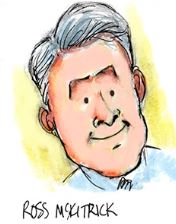
|
|
Global Warming: Temperature-Indexed Tax
In recent years I have been working on developing a policy proposal that reconciles my doubts about the seriousness of the global warming problem with the worries of those who do worry: calibrate a carbon tax to the average temperature of the region of the atmosphere predicted by climatologists to be most sensitive to CO2. I have also looked at how coupling it to a futures market for tax exemption certificates could turn the financial markets into the world's most powerful (and objective) climate model.
For a quick non-technical intro see my House of Lords presentation, for a more detailed explanation see my Handbook chapter.
For a quick non-technical intro see my House of Lords presentation, for a more detailed explanation see my Handbook chapter.
|
ACADEMIC PAPERS
INFORMATION AGGREGATION IN A PREDICTION MARKET FOR CLIMATE OUTCOMES
Elmira Aliakbari and I published a study on how to turn financial markets into the world's most powerful climate prediction system:
This is one of those situations in which a simple and intuitively clear idea takes a great deal of complex math to prove. Suppose a carbon tax is tied to atmospheric temperatures. And suppose that the government auctions off certificates that exempt an emitter from paying the tax on a tonne of emissions for a particular year in the future. In order to price those certificates, the market would have to come up with forecasts of warming. The resulting price path would reveal the market's forecast of climate. How good a forecast is it? This paper shows that the market forecast would be unbiased, and it would potentially use all available information. The circumstance in which it would definitely use all available information is if there is a strong consensus on climate science. So if you believe that the market forecast has ignored important information you would have to believe there is only a weak or non-existent scientific consensus, and vice versa. This was earlier released as a UofG working paper:
FORMING A MAJORITY COALITION FOR CARBON TAXES UNDER A STATE-CONTINGENT UPDATING RULE
As part of my ongoing project on state-contingent emission pricing I have a new paper with Jamie Lee that looks at the political side of implementing carbon taxes:
An Overview of the State-Contingent Carbon Tax - Futures Market Mechanism
This was an invited chapter for a book on climate economics that was published in 2013.
It provides a reasonably complete overview of the topic, including an intuitive explanation of the idea, the formal derivation of the tax rule, and an explanation of how the associated futures market would work by turning global financial markets into the world's most powerful climate model. I released a formal version of my tax proposal as a working paper through SSRN in 2008. A revised version was published in Energy Economics in 2010.
|
OTHER
An Evidence-Based Approach to Pricing CO2 Emissions: Presentation at House of Lords, UK
On July 3rd 2013 I presented a paper to the Global Warming Policy Foundation at the House of Lords in the UK entitled An Evidence-Based Approach to Pricing CO2 Emissions. This has been published by the GWPF as a commentary.
A cartoonist in the audience (Josh) made a fun set of visual notes. There was an article in the UK Register and a blog post by Marcel Crok. The comment threads at Bishop Hill and Watts Up revealed a lot of confusion about what I was talking about, so I have prepared a detailed response. John Tierney of the New York Times did a feature on the idea on December 15, 2009:
If that link goes dead a PDF of the article is here. |
Proudly powered by Weebly